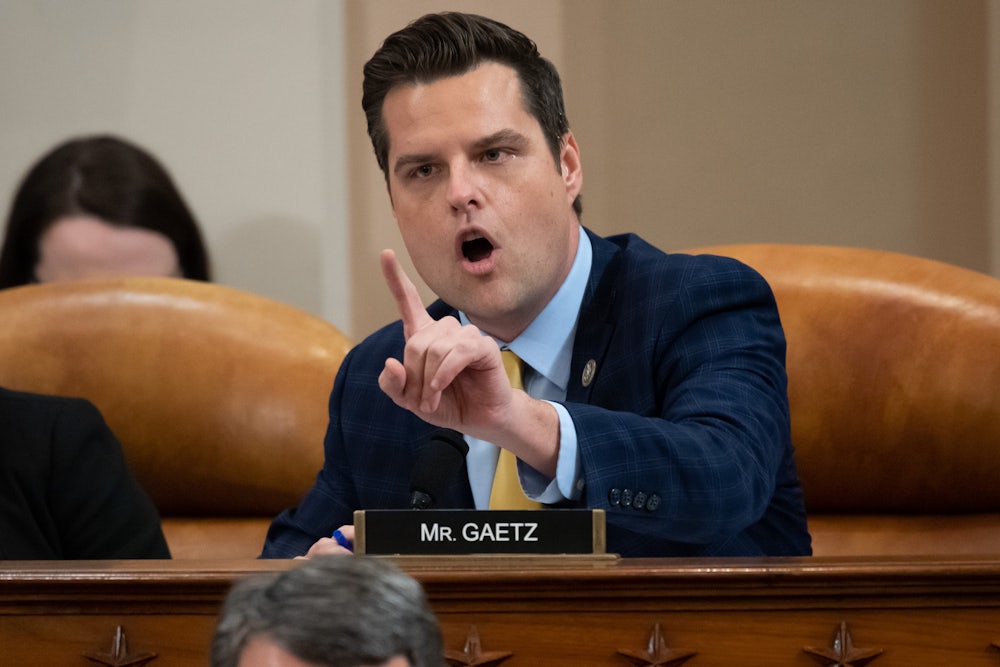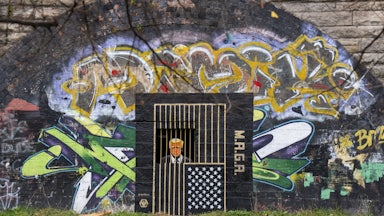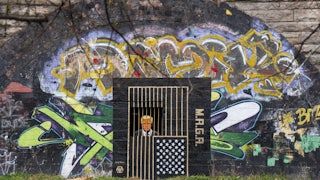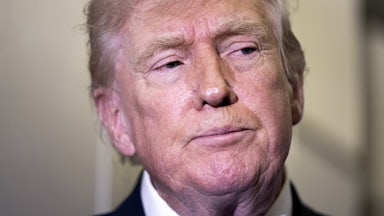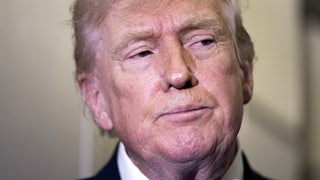On Tuesday morning, Axios reported that Florida Representative Matt Gaetz was thinking about leaving Congress for a conservative media gig, perhaps at Newsmax or another friendly outlet. This wasn’t a big surprise. More than a few House GOP lawmakers appear to be more interested in burnishing their public profile than passing legislation or conducting oversight. After she lost her committee assignments last month, Georgia Congresswoman Marjorie Taylor Greene told reporters that she would now be free to “make connections and build a huge amount of support that I’ve already got started with.” For Gaetz, a prominent Trump acolyte with virtually no legislative accomplishments, right-wing cable TV would be a natural fit.
Then the other shoe dropped. The New York Times reported on Tuesday night that the Justice Department is investigating allegations that Gaetz had a sexual relationship with a 17-year-old girl, that he may have paid her to travel across state lines, and that he may have violated federal laws on sex trafficking as a result. According to the Times, the DOJ investigation spun out of an inquiry into a local official in Florida, who is an associate of Gaetz and who was indicted on sex-trafficking charges last year.
Federal prosecutors haven’t filed any charges against Gaetz so far, and the exact timing of the alleged events is unclear. As my colleague Melissa Gira Grant has noted, law-enforcement officials also have an unfortunate habit of overhyping claims of sex trafficking to the public when announcing arrests or busts. What’s more interesting for now about the Gaetz case is the Trumpian public-relations “strategy” that he pursued once the Times story went public.
A good rule of thumb when under investigation is to avoid making comments that could incriminate you further. Gaetz chose a different path. In his first interview with the Times, he seemed to profess ignorance about what the department was investigating. At the same time, he suggested it could have some relation to his actual conduct. “I only know that it has to do with women,” Gaetz told the newspaper. “I have a suspicion that someone is trying to recategorize my generosity to ex-girlfriends as something more untoward.”
Later on Tuesday night, Axios published an interview with Gaetz where he claimed that federal officials told him he was a subject of the investigation, a label that covers a wide range of behavior that isn’t necessarily criminal, instead of a target of it. Trump also often highlighted this distinction as proof of his innocence during the Russia investigation’s early stages. But the subject/target category can change as federal prosecutors uncover more evidence in a case, so it isn’t necessarily a bill of clean health.
Gaetz also began to make contradictory claims. Axios quoted him as saying that he was “unclear” about the specific allegations and that he’d been told “very little” about the investigation itself. That wouldn’t be surprising, as subjects of most federal investigations aren’t necessarily told a lot about those investigations. But Gaetz simultaneously told Axios that he and his father, Don Gaetz, an influential former Florida state senator, had actually been working with the FBI for “weeks” on the case. Then he started announcing that the sex-trafficking investigation was actually a plot to extort him and his family for millions of dollars.
“Over the past several weeks my family and I have been victims of an organized criminal extortion involving a former DOJ official seeking $25 million while threatening to smear my name,” Gaetz claimed in a series of posts on Twitter. “We have been cooperating with federal authorities in this matter and my father has even been wearing a wire at the FBI’s direction to catch these criminals. The planted leak to the FBI tonight was intended to thwart that investigation.”
There’s a lot going on here. To start, if your father is actually wearing a wire to obtain evidence that might exonerate you in a federal sting operation, tweeting about it might be ill-advised. The Justice Department and the FBI also don’t publicly comment on ongoing investigations as a matter of policy, so they can’t exactly go out and say, “Yep, that’s exactly what’s happening.” (Perhaps more to the point, nor can they deny it if it’s false.) And if what Gaetz said on Twitter was true, why did he initially profess ignorance of the circumstances surrounding the investigation?
In an interview with Fox’s Tucker Carlson that aired after the Axios story and his tweets were published, Gaetz identified his alleged extortionist as David McGee, a veteran Justice Department official who now works for a law firm in Florida. McGee, for his part, told The Daily Beast on Wednesday that Gaetz’s extortion claims were “completely, totally false” and a “blatant attempt to distract from the fact that Matt Gaetz is apparently about to be indicted for sex trafficking underage girls.” (It’s unclear if such an indictment is actually imminent.)
This is a familiar dynamic to anyone who hasn’t repressed their memories of Trump’s presidency. The former president spent most of his four years in office vociferously denying that he had done anything wrong in the myriad scandals he faced and often claimed that it was actually someone else who had acted disgracefully. According to him, the controversial call with Ukrainian President Volodymyr Zelenskiy that led to his first impeachment was “a perfect call” and the pre-insurrection speech on January 6 that led to his second impeachment was “totally appropriate.”
From time to time, Trump would give television interviews where he would effectively admit that he’d done what he was accused of, a pioneering innovation in the field of public relations. Perhaps the most famous instance came early in his presidency, when he told NBC’s Lester Holt that he fired former FBI Director James Comey because of the Russia investigation. But it wasn’t the only time he provided evidence that bolstered his opponents’ cases against him. It was the White House that released the transcript of the Zelenskiy call in question, for example, that validated some of a whistleblower’s claims and pushed the House towards his first impeachment inquiry.
During his crisis-management efforts on Tuesday night, Gaetz also eagerly volunteered details that did not disprove the allegations against him. “I have definitely, in my single days, provided for women I’ve dated,” he told Axios. “You know, I’ve paid for flights, for hotel rooms. I’ve been, you know, generous as a partner. I think someone is trying to make that look criminal when it is not.” In the Fox interview, Gaetz even claimed that he, Carlson, and Carlson’s wife had once dined together with a woman who was questioned by FBI agents about this case.
“You and I went to dinner about two years ago,” Gaetz told him. “Your wife was there, and I brought a friend of mine, you’ll remember here and she was actually threatened by the FBI and told that if she wouldn’t cop to the fact that somehow I was involved in some pay-for-play scheme, that she could face trouble. So I do believe there are people at the Department of Justice that are trying to smear me. Providing for flights and hotel rooms for people that you’re dating who are of legal age is not a crime.” Gaetz did not explain why FBI agents would “threaten” the unnamed woman if the bureau was also working to exonerate him. Carlson replied that he couldn’t remember the woman or dinner in question. He told viewers after a commercial break that the Gaetz interview was one of the strangest he’d ever conducted.
So, to sum up–is it possible that federal prosecutors are running cover for an extortion plot against Gaetz while Gaetz simultaneously works with FBI agents to thwart it? Sure, I guess, in the sense that all things that don’t violate the fundamental laws of nature are possible in an infinite number of universes. Attorney General Merrick Garland might have some questions about whether the Justice Department is really playing some Grisham-esque cat-and-mouse games with itself over a mid-tier Florida congressman.
But it’s also possible that there is some substance to the allegations against Gaetz and that he’s simply trying to discredit the investigation by claiming that it’s a conspiracy, and everyone is out to get him. It doesn’t really help Gaetz’s case that he keeps validating every part of the allegations other than the actual crime itself. This strategy worked moderately well for Trump, who reframed the Russia investigation for his supporters into a plot by Democrats and the “deep state” to bring down his presidency. But he had one key advantage that even his most fervent allies do not: He was the president of the United States at the time, and thus protected by Justice Department policies against indicting sitting presidents. Gaetz may find that Trump-like tactics work less well when you’re not, well, Donald Trump.
